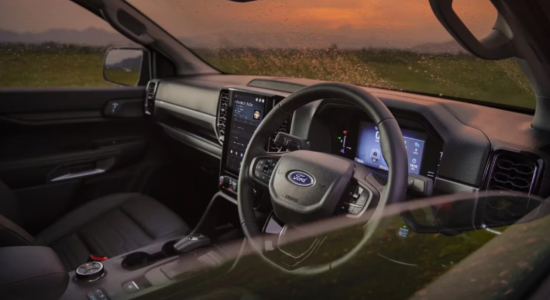Attention drivers: Are new regulations set to skyrocket the price of ute or SUV?
The government is rolling out a New Vehicle Efficiency Standard (NVES) aimed at revolutionising the automotive landscape.
With a focus on reducing emissions and promoting fuel efficiency, this initiative promises to bring environmentally friendly and cost-effective options to Aussie roads.
However, this could potentially hit the wallets of ute and SUV owners hard.
The proposed standards, which are currently under consultation, will apply to new passenger and light commercial vehicles in Australia, aligning the country with the United States.
According to the Chief Executive of the Federal Chamber of Automotive Industries, Tony Webber, those planning to purchase a new Ford Ranger may have to spend thousands more starting next year.
With the new standards, Webber estimates that a Ford Ranger could cost up to $6,150 more.
Other vehicles that could see a price hike include popular models like the Toyota Land Cruiser, Mazda CX5, and Isuzu D Max.
On the flip side, eco-friendly car options, such as electric vehicles (EV), are expected to benefit from these new regulations, potentially seeing a decrease in prices.
This is part of the government's broader strategy to encourage car makers to sell more electric and fuel-efficient vehicles, thereby offering more choices to consumers.
Minister for Climate Change and Energy Chris Bowen unveiled the preferred model earlier this month, expressing his expectation that it would deliver more choices to would-be buyers.
‘The standard increases choice. It doesn’t dictate what sort of car or ute people can buy, but will mean you have a wider range of modern and cheaper to run vehicles,’ his statement read.
‘As you make the choice about your next car, it’s only fair you have the widest range of options possible to get the car that is right for you and right for your hip pocket,’ he added.
However, the transition to more fuel-efficient and electric vehicles is not without its challenges.
Webber emphasised the need for careful consideration and planning, cautioning against rushing the process.
'This is a movement ultimately to electric vehicles, but it's going to take time,' he said.
'We know electric vehicles, but technology doesn't work for everyone, it's expensive. We need the infrastructure recharging, especially for people living in apartment blocks.’
‘It's complex. Let's not rush it,’ he expressed.
The government plans to introduce the legislation as soon as possible, with the new cost-saving rules expected to come into effect by January 1, 2025.
The Department of Infrastructure, Transport, Regional Development, Communications and the Arts website has outlined the benefits of NVES.
According to them, it will serve to alleviate financial burdens by cutting costs at the petrol station while also affording consumers a broader selection of vehicle options.
They also mentioned that these standards will play a crucial role in mitigating transport emissions, consequently improving air quality and safeguarding the health and well-being of individuals and families alike.
If you’d like to learn more about NVES, you can read this paper: New Vehicle Efficiency Standard—Cleaner and Cheaper to run Cars for Australia.
You can also watch their video here:
Source: Infra, Transport, Regional, Comms & Arts/Youtube

What do you think about these proposed standards? Do you believe they will benefit consumers in the long run, or do you have concerns about their potential impact on vehicle prices? Share your thoughts in the comments below.
With a focus on reducing emissions and promoting fuel efficiency, this initiative promises to bring environmentally friendly and cost-effective options to Aussie roads.
However, this could potentially hit the wallets of ute and SUV owners hard.
The proposed standards, which are currently under consultation, will apply to new passenger and light commercial vehicles in Australia, aligning the country with the United States.
According to the Chief Executive of the Federal Chamber of Automotive Industries, Tony Webber, those planning to purchase a new Ford Ranger may have to spend thousands more starting next year.
With the new standards, Webber estimates that a Ford Ranger could cost up to $6,150 more.
Other vehicles that could see a price hike include popular models like the Toyota Land Cruiser, Mazda CX5, and Isuzu D Max.
On the flip side, eco-friendly car options, such as electric vehicles (EV), are expected to benefit from these new regulations, potentially seeing a decrease in prices.
This is part of the government's broader strategy to encourage car makers to sell more electric and fuel-efficient vehicles, thereby offering more choices to consumers.
Minister for Climate Change and Energy Chris Bowen unveiled the preferred model earlier this month, expressing his expectation that it would deliver more choices to would-be buyers.
‘The standard increases choice. It doesn’t dictate what sort of car or ute people can buy, but will mean you have a wider range of modern and cheaper to run vehicles,’ his statement read.
‘As you make the choice about your next car, it’s only fair you have the widest range of options possible to get the car that is right for you and right for your hip pocket,’ he added.
However, the transition to more fuel-efficient and electric vehicles is not without its challenges.
Webber emphasised the need for careful consideration and planning, cautioning against rushing the process.
'This is a movement ultimately to electric vehicles, but it's going to take time,' he said.
'We know electric vehicles, but technology doesn't work for everyone, it's expensive. We need the infrastructure recharging, especially for people living in apartment blocks.’
‘It's complex. Let's not rush it,’ he expressed.
The government plans to introduce the legislation as soon as possible, with the new cost-saving rules expected to come into effect by January 1, 2025.
The Department of Infrastructure, Transport, Regional Development, Communications and the Arts website has outlined the benefits of NVES.
According to them, it will serve to alleviate financial burdens by cutting costs at the petrol station while also affording consumers a broader selection of vehicle options.
They also mentioned that these standards will play a crucial role in mitigating transport emissions, consequently improving air quality and safeguarding the health and well-being of individuals and families alike.
If you’d like to learn more about NVES, you can read this paper: New Vehicle Efficiency Standard—Cleaner and Cheaper to run Cars for Australia.
You can also watch their video here:
Source: Infra, Transport, Regional, Comms & Arts/Youtube
Key Takeaways
- Australians may face higher prices for utes and SUVs with the introduction of New Vehicle Efficiency Standard (NVES).
- The Ford Ranger, Australia's top-selling car in 2023, could see price increases of up to $6,150 for new models starting next year.
- The new standards will align Australia with United States regulations and will not affect current cars but only new passenger and light commercial vehicles.
- Eco-friendly options like electric vehicles (EV) could become more affordable as a result of the new rules, with the government aiming to encourage the adoption of more electric and fuel-efficient cars.
What do you think about these proposed standards? Do you believe they will benefit consumers in the long run, or do you have concerns about their potential impact on vehicle prices? Share your thoughts in the comments below.
Last edited:








